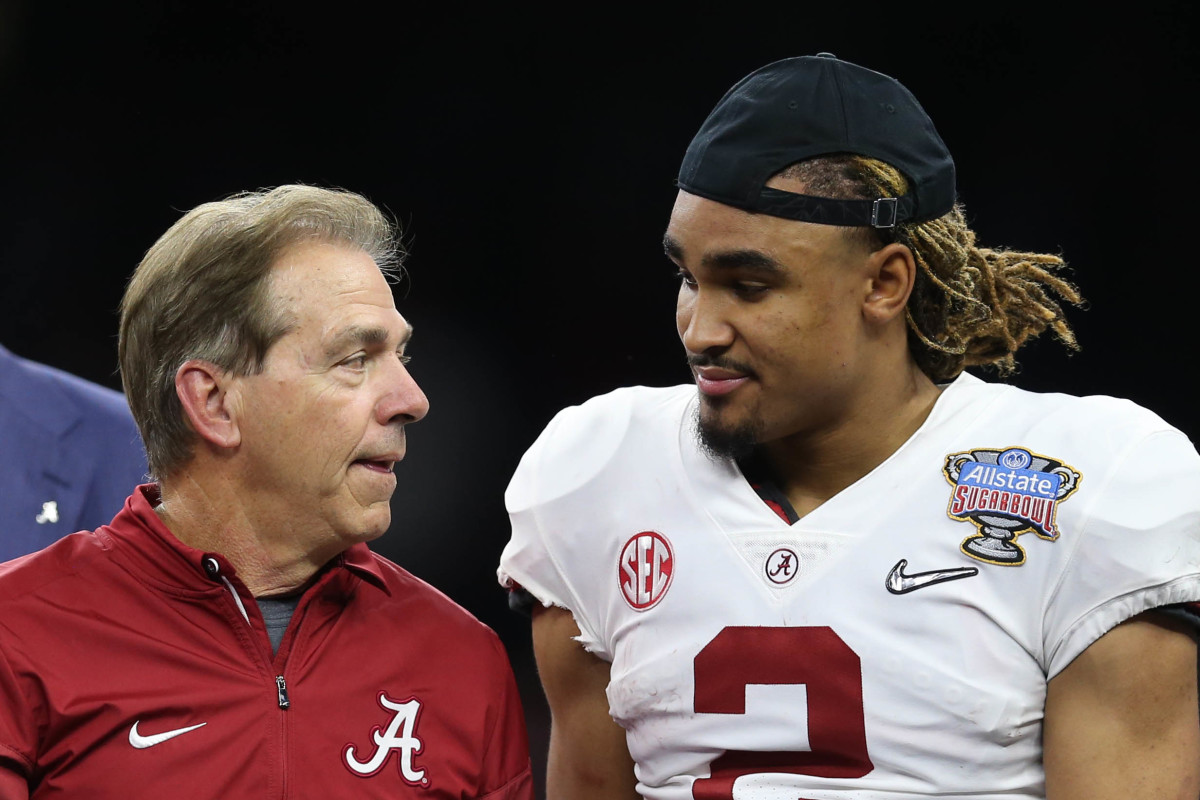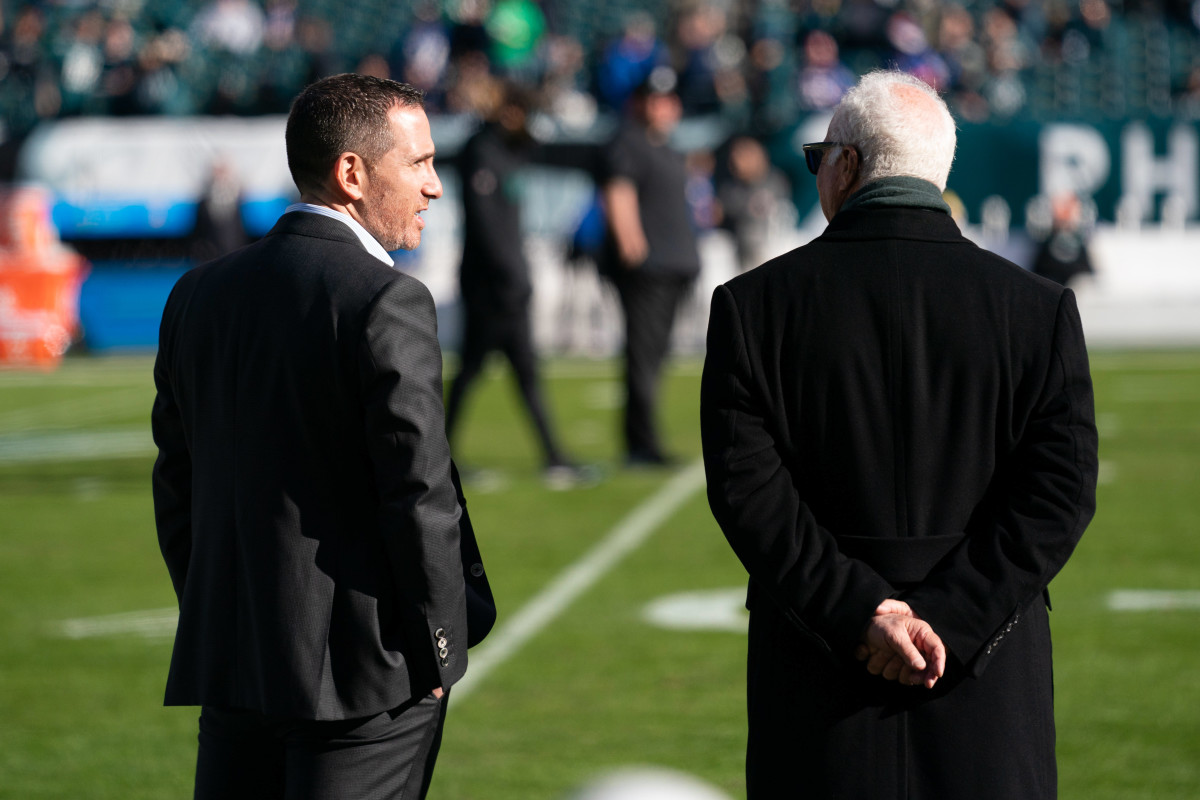Nick Saban on Jalen Hurts

The last time Jalen Hurts played a football game despite a significant injury, he wasn’t supposed to play at all. This was December 2018, the SEC championship.
As the whole world watched, Hurts was benched at halftime of the national championship game the previous season against Georgia. Tua Tagovailoa replaced him and led the Crimson Tide to a national title. Hurts remained gracious, in public and in private, and that struck his coach as both typical of his quarterback and unusual for anyone thrust into his position. Nick Saban himself notes that, on the night that he swapped quarterbacks—out of necessity, no disrespect intended—Hurts held a 26–2 record as the Crimson Tide’s starter.
Hurts didn’t complain. He didn’t do anything differently, really. He showed up in Alabama’s weight room the morning after his benching and, when he saw freshmen goofing off, he gathered them and told them they had a standard to live up to. No matter what happens. Every. Single. Day. When Tagovailoa retained the starting job in 2018, Hurts didn’t change then, either. Same routines. Same standards.
“The thing that impressed me most about [Hurts] is how he handled the situation when he got replaced,” Saban told Sports Illustrated over the phone this week. “That’s the kind of person he is, the impact he had on people around him, the dedication.” He was the same guy, all year long. “I mean, that’s Jalen,” Saban says. “Just volumes and volumes of character.”

On that night in 2018, in the SEC championship game, against mighty Georgia, a script that would be rejected by even the most naive Hollywood agent unfolded like a movie. Hurts had come down with a high ankle sprain against Tennessee in October, and, since he was no longer starting, he had “tightrope” surgery to repair the ligaments—the school termed the procedure “minor” at the time. But he went into the conference title affair banged up. He could play, but he had little reason beyond Tagovailoa’s own high ankle sprain to believe the Crimson Tide might need him for more than spot duty.
They would. Georgia—the same opponent Hurts was benched against—opened a two-touchdown lead. Tagovailoa went out with an injury related to the sprain. Hurts jogged onto the field in less than full health. At that moment, everyone in the program thanked their deities that Hurts had not transferred elsewhere, as most players would have. He sparked a fourth-quarter comeback that vaulted the Crimson Tide into the College Football Playoff.
Alabama would advance to the national championship game. Tagovailoa would reclaim the starting gig. Hurts would go back to spot duty and the bench. Clemson would blow out the Crimson Tide. At that point, Hurts did transfer, but Saban notes he chose Oklahoma, in part, because he wanted to apprentice under quarterback whisperer Lincoln Riley to become a better, more fluid passer. “He chose to go to the most challenging place and had a very successful year,” Saban says. He sees both that game and the next season as more proof of Hurts’s integrity and character.
Suddenly, Saban remembers a commercial he had seen recently. He cannot remember the product, but the tagline is: “Be Comfortable in Your Skin.” Every time he sees those spots, Saban thinks about Hurts and how he embodies the slogan. He ranks among the most self-assured, self-reliant players that Saban has ever coached.
“He had to make himself into a guy who would never be satisfied, until he got to where he is right now,” Saban says. “The biggest reason is he has great insight into who he is.”
THEN AND NOW:
This is Eagles owner Jeffrey Lurie from our conversation the week before his franchise won Super Bowl LII five years ago. He’s talking about Howie Roseman, who’s still his general manager, and Chip Kelly, who used to be his head coach. Specifically, this is an insightful quote regarding Roseman’s gap year and how it shaped everything moving forward, including this season.
“Sometimes, as the CEO, you’ve got to try to balance and achieve things in unorthodox ways. I needed to know whether Chip Kelly could succeed in a way that allowed us to know that best, which was to allow him to have control over the football operation, and he really didn’t want to work with Howie. I thought Howie was a really good young executive and I didn’t want to lose him.
“So, how can I possibly make this work? The traditional thing [would be] Chip’s in, Howie’s out. I was having none of that. I was willing to give Chip a chance, but it had to be on my terms, which were: I was going to keep Howie involved but utilize that year as a real learning year. Howie talked to you about what he did. We talk all the time about what the goals were from that year. … His ability to lead different departments within football operations were much better. It turned out to be a win-win situation.

“It helped a lot because he was a hard-charging young executive who became a GM at a very, very young age. I could see the potential, and that’s why he was in the position he was in. You could also see that he was at times overzealous and needed to analyze himself in a fuller way. He got to spend a lot of time with great GMs around the world. He saw how they built their rosters, business people, and how they relate to different people who report to them. He’s just done an outstanding job. We’ve always had a great relationship, I think, I respect his intelligence and his willingness to be critically analytic of what we should do strategically. It’s always my strategy to be more strategic.”
ON BACKGROUND:
I’m consistently surprised by how people react to Andy Reid as an “offensive innovator” in NFL history. Totally split out here. Many I spoke with don’t see him as having innovated much at all. Others see that as an unfair argument, given that most of offensive football has already been created, and after losing Tyreek Hill, Reid tweaked his scheme this season to put the Chiefs right back to where they usually are: contending for a championship. I’m in the latter camp. But many I spoke with chalk that up to recency bias, wanting to make more of that notion than is there.
QUOTE WITHOUT CONTEXT:
“The Grammys were fun. The Eagles are better. [Laughs.] If we can get a win, then this will be the greatest week of my life.”
CONTEXT:
This is DJ Jazzy Jeff, discussing his beloved Eagles after an epic Grammy performance last week. More from that interview coming soon …
ELSEWHERE ON THE MMQB:
• A look back at Super Bowl XLIX, with the help of Marshawn Lynch
• Jimmy Traina on Andy Reid as the star of Super Bowl week
• The MMQB staff makes their Super Bowl picks and predictions
